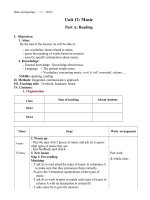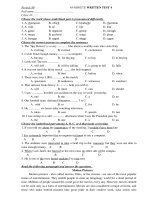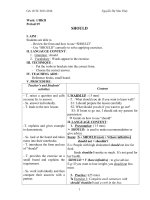GIÁO ÁN TIẾNG ANH LỚP 10 bam sat 10 1
Bạn đang xem bản rút gọn của tài liệu. Xem và tải ngay bản đầy đủ của tài liệu tại đây (84.01 KB, 3 trang )
Self-chosen - English 10
Date:…../…………/……….
Period: 01
HOW TO MAKE UP A SENTENCE
I. AIM : Students are able to
- Learn how to make meaningful sentences, using the given words.
- Using the simple present tense with adverbs of frequency correctly.
II. LANGAUGE CONTENT :
1. Grammar : The simple present tense, adverbs of frequency, the simple past tense
2. Vocabulary : words appear in the exercise.
III. PROCEDURE :
Teacher’s and Students’ activities
- T. introduces the game and explains its
rule : One player starts the game first by
making a sentence, the other players have to
repeat the sentence of the former player and
then give out his/ her ideas.
- T. starts first with a conditional sentence.
- Ss. take turns to repeat and give their
sentence afterwards.
- The winner is the person who can
remember the sentence longer and
correctly.
- T. gives the definition of a simple
sentence.
- T gives examples to illustrate.
- T. introduces the cases we use an object
after a verb or not.
- T. gives examples and explains them to
help Ss. make clear.
- Ss. listen to T.’s explanation, observe at
the board while taking notes into their
notebooks.
Teacher : Nguyeãn Thò Thu Thuû y
Content
I. WARM UP :
Game : “ Who can remember longer ?”
- T. : If I win a special lottery, I’ll buy a new motorbike
- S1 : If I win a special lottery, I’ll buy a new motorbike and a
car.
- S2 : If I win a special lottery, I’ll buy a new motorbike, a car
and a cell phone.
- S3 : If I win a special lottery, I’ll buy a new motorbike, a car,
a cell phone and a new watch.
- S4 : If I win a special lottery, I’ll buy a new motorbike, a car,
a cell phone, a new watch and a new house.
- S5 :………………………………………………………………………………………………….
II. LANGUAGE CONTENT :
1. Presentation:
Definition : A simple sentence is a complete unit of
meaning which contains a subject and a verb, followed, if
necessary, by other words which make up the meaning.
Form : Sentence = Subject + Verb…..
E.g : Made in Germany : is correct English but it is not a
sentence because it doesn’t have a subject.
My car was made in Germany is a complete sentence with a
subject and a verb.
Verbs with and without objects :
+ We always have to use an object after some verbs. We
call these transitive verbs.
E.g : Arsenal beat (unclear meaning)
Arsenal beat Liverpool (complete sentence)
+ Some verbs never take an object. We call these
intransitive verbs.
E.g :We arrived at 11.
+ Some verbs can be used transitively or intransitively.
E.g : Arsenal won / Arsenal won the match.
Compound sentence: When we join two or more simple
sentences using a conjunction, we make a compound sentence.
E.g: Tom phoned. He left a message Tom phoned and
Self-chosen - English 10
- T. shows a mini board to provide Ss. the
exercise.
- T. explains the exercise and guides Ss. to
do it.
- T. reminds Ss. to add some more elements
as well as supply the form of the main verbs.
- Ss. work individually and then compare
their answers with a partner.
- T. goes around the class and offers help.
- After some minutes, T. asks some Ss. to go
to the board and write down their sentences.
- T. checks and corrects with the whole
class.
- T. provides the task on a mini board and
has Ss. copy into their notebooks.
- T. explains the requirement of the task.
- T. works with one sentence to make a
model for Ss. to follow.
- T. also provides the meanings of some
difficult words.
- Then, T. has Ss. work in pairs to discuss
the answers.
- T. goes around the class to check and
provide help if necessary.
- After some minutes, T calls on some Ss. to
write their answers on the board.
- T. has other Ss. give comment and suggest
correction if the sentences are wrong.
- T. gives final feedback.
Teacher : Nguyeãn Thò Thu Thuû y
left a message (compound sentence)
2. Practice:
Exercise 1 : Use the given words to make meaningful
sentences.
1. I / usually / go out / dinner / my friend / Saturday nights.
2. We / often / go / countryside / twice / a month.
3. Mrs. Lan / enjoy / teaching profession.
4. Sometimes / we / come / see / neighbours / a cup / tea.
5. We / all / feel / contented / what / do.
6. She / seldom / late / class.
7. I / bed / by / eleven / as / rule.
Answers :
1. I usually go out for dinner with my friends on Saturday nights.
2. We often go to the countryside twice a month.
3. Mrs. Lan enjoys her teaching profession.
4. Sometimes we come to see our neighbours for a cup of tea.
5. We are all feel contented with what we do.
6. She is seldom late for class.
7. I’m in bed by eleven as a rule.
Exercise 2: Rewrite the sentences that don’t make sense
and make these sentences in the exercise S V O to show Subject,
Verb, Object. .
1. Has set John Bailey a new high jump record. John
Bailey (S) has set (V) a new high jump record (O).
2. The passport examined the passport officer.
3. These biscuits don’t like the dogs.
4. The shop assistant is wrapping the parcel.
5. Have seen the visitors the new buildings.
6. My father didn’t wash the dishes.
7. The pipe is going to fix the plumber.
8. Will the goalkeeper coach the ball?
9. Has the meal enjoyed the guest?]
10. Can’t play John the game.
Answers:
2. The passport officer (S examined (V) the passport (O).
3. The dogs (S) don’t like (V) these biscuits (O).
4. correct
5. The visitors (S) have seen (V) the new buildings (O).
6. correct
7. The plumber (S) is going to fix (V) the pipe (O).
8. correct
9. Has the guest (S) enjoyed (V) the meal (O)?
10. John (S) can’t play (V) the game (O).
III. HOMEWORK :
-Ss. review the simple present tense, the position of adverbs of
frequency and do exercise 1 (page 9 -workbook English 10)
Self-chosen - English 10
Teacher : Nguyeãn Thò Thu Thuû y









